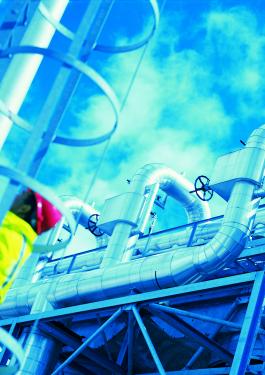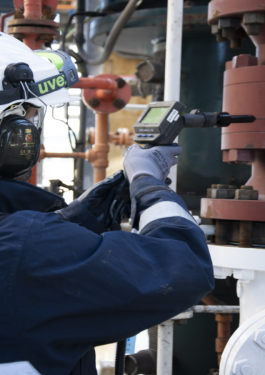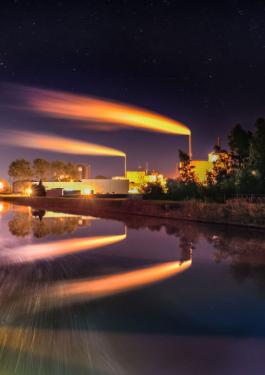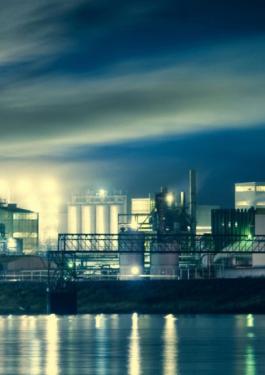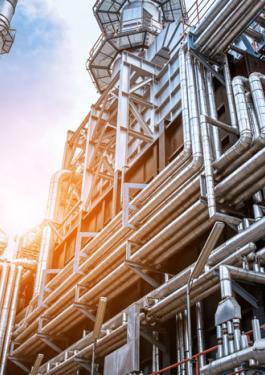Gas & Biogas
Bureau Veritas supports industrial players on safety, environmental and economic issues, delivering expertise across the whole natural gas and biogas chain.
The development of the biogas production
The Global Warming Potential (GWP) of methane is 28 times greater than that of CO2. Since 2007, we have recorded a strong increase in methane emissions. The gas is the third most used resource in the production of energy.
The development of the biogas production sector as an alternative to fossil fuels is now compelling. Biogas, or biomethane, is produced from the anaerobic fermentation of organic matter. It enables recovery of the matter and contributes to a responsible production system. We assist biogas plant operators in their activities by conducting inspections specific to this type of facility. Our growing experience in this field makes us an effective partner, fully aware of your issues.
Whether the gas is used to generate electricity via co-generation, or injected into the mains gas network, it will contribute to energy transition goals. Our experience in leak detection in industrial plants means we are able to assist these operators in the continuous improvement of their facilities. When businesses commit to reducing their greenhouse gas emissions, they are taking action in favour of the environment by reducing their product losses and also improving overall safety.
Prevent risks in natural gas and biogas production
Each player in the chain is facing two primary issues: the safety of people and assets, and the minimisation of environmental impacts. Our solutions for gas and biogas:
- Gas exploration and production (Onshore, FLNG, GTL, etc.)
- Liquefaction for LNG (Liquefied Natural Gas)
- Storage (LNG, CNG)
- Transport & distribution
Prevent external and internal leaks
Bureau Veritas can test for all types of emissions and reduce all external and internal leaks.
For example:
Testing for and reducing fugitive VOC emissions (leaks of Volatile Organic Compounds)
In production plants, valves, flanges, pumps, and compressors are exposed to harsh operating conditions and inevitably suffer from ageing. Seals deteriorate over time and generate leaks, which may turn out to be very costly and hazardous in terms of safety (creating an ATEX zone) and health (CMR products).
The eradication of external leaks increases plant productivity and improves safety, while minimising the impacts on health and the environment. Our missions also ensure you are fully compliant with all regulations.
This service also applies to Cylinder Filling plants.
Testing for and reducing leaks on utility networks
Our diagnostics can considerably reduce fluid losses (compressed air, nitrogen, gas, etc.) and have a significantly beneficial impact on your energy expenditure.
Diagnosis of internal leaks and flare inspections
For certain plants, reducing internal leaks on valves and actuators represents a key issue in terms of health, the environment and the economy.
Testing for channelled VOC emissions
Testing for surface and channelled VOC emissions
Measuring the efficiency of your VOC treatment facilities (e.g VRU) ensures that your equipment is functioning correctly or to confirm your compliance with emissions control regulations.
We can run tests to rapidly assess the condition of some equipment, for example:
- vents downstream of safety valves on gas compression or distribution stations
- vents on LNG tanks and storage tanks
- etc.
Landfills
Landfills aim to operate under optimal conditions in terms of safety and environmental protection.
Bureau Veritas supports operators in their risk management and specifically in preventing air pollution, to achieve their health, safety or regulatory objectives.
On landfills, the operator faces such critical issues as preventing fire risk, preventing air pollution, and optimising facility efficiency. In addition to commissioning for new facilities, Bureau Veritas delivers proven detection solutions to operators to identify biogas or toxic gas leaks such as H2S, thereby addressing multiple questions:
- safety (fire risk)
- environment (greenhouse gas emissions)
- health (toxic products)
- odours (H2S and other gases)
Bureau Veritas teams are active in commissioning facilities, supporting maintenance or reducing olfactory nuisances and also in regulatory compliance activities, such as the decision of 15/02/16 relating to non-hazardous waste storage facilities (ISDND) in terms of mapping biogas emissions.
